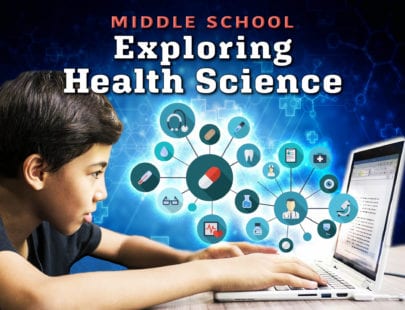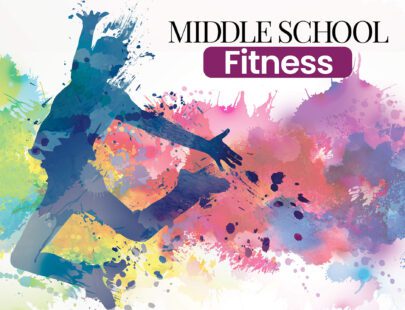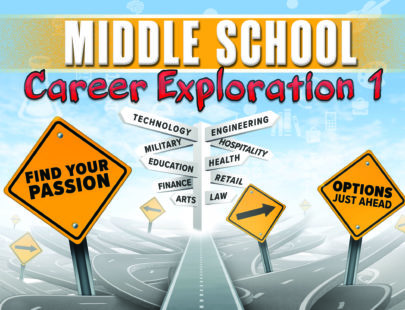
Middle School Health
Middle school is a tangle of excitement, changes, and transformations that are sometimes surprising, challenging, and just plain confusing. In this course, you will be given tools and information to help you navigate your teenage world. You will learn about all aspects of health- mental, physical, social, and emotional- and you will learn how to set goals for yourself to improve all facets of your wellbeing. All of these tools can help untangle the sometimes confusing world of middle school and this knowledge can help lead to a healthier and happier you!
Units at a Glance
Unit 1: What is Health?
What do you think it means to be healthy? Eating chef salads for lunch? Participating in a team sport? While good health does include physical activity and eating nutritious foods, it is much more than that. In the simplest terms, being healthy means taking care of yourself- which includes your body, mind, emotions, and social needs. Just as science includes biology, physics, chemistry, medicine, and more, health is a big topic with many components. Are some people healthy and others aren’t? Rather than being an “either/or” thing, health exists on a spectrum, and we can always improve our health, no matter where we start. Be prepared to expand your mind on all things health, but beware: you’re likely to leave here healthier than you came.
What will you learn in this unit?
- Explain how physical, mental/emotional, social, and intellectual dimensions of health are interrelated
- Describe how personal values, family, and culture influence an individual’s health
- Evaluate how social norms, school, media, and technology impact healthy and unhealthy behaviors
- Identify the importance of taking responsibility for one’s health
- Assess personal health practices related to nutrition and physical activity and determine a short-term health goal
Unit 2: My Body and My Mind
Your body is your home in life, and because you only get one, it’s important to understand it and take care of it. Just how does your body work to keep you alive? How do you keep your body healthy and safe? What if something feels “off” in your body or your mind? Where can you find help? These are all great questions! Let’s discover how we can care for our bodies and our minds and even improve our lives!
What will you learn in this unit?
- Explain how puberty impacts each of the different domains of health
- Understand how to use health information and first aid to help yourself and others
- Describe the difference between healthy and unhealthy self-management strategies for stress and anxiety
- Examine the resources available for mental health help for issues such as suicide, self-harm, and eating disorders
Unit 3: Relationships that Rock
Relationships can be tough sometimes! There are so many questions: How do I know if I have good friends? How can I be a good friend? When I start dating, what should I look for in a partner? How can I protect my health while I am dating? Relationships—both friendships and partnerships—are an important topic to cover in our conversation on health. In fact, you can actually improve your health by improving your relationships. Are you ready for all things social? Here we go!
What will you learn in this unit?
- Determine how social groups and peers influence health
- Develop communication and conflict resolution skills
- Describe healthy ways to express romantic love
- Make healthy decisions about romantic relationships
- Identify protective strategies to avoid unsafe relationships
Unit 4: Weighty Decisions
Decisions, decisions! We are faced with them every day. What we choose to put in our bodies always affects our health, for better or for worse. So, what do we need to make good decisions? The facts are needed; we should know and understand how different substances affect our bodies, brains, and emotions. Then, some critical thinking skills will help us weigh the short- and long-term impacts of what we decide. So let’s get started! We’ll learn all the information we need to make wise choices and maybe even help others choose wisely too!
What will you learn in this unit?
- Understand the dangers of underage consumption of alcohol
- Describe the short- and long-term physical and social consequences of tobacco and/or nicotine use
- Discuss the effects of marijuana/THC on the brain, the body, and behavior
- Differentiate between proper and improper use of prescription drugs
- Analyze the importance of alternative activities to drug and substance use and misuse
Unit 5: Looking Beyond
Did you know that you can be instrumental in causing healthy change in your school, neighborhood, and even beyond? While our schools and communities affect our health, we also can affect the health of our communities—it’s a two-way street. So what makes a healthy community? Taking care of yourself is the first step; the next is looking around you. What can you do to help those around you improve their physical, emotional, mental, or social health? Simple things like asking questions and being a good listener can go a long way. What particular health issues are you passionate or concerned about? A community relies on people working together toward positive change. So how exactly can you improve the health of your community? Let’s find out!
What will you learn in this unit?
- Explain and support a personal position on a health-related issue
- Discuss strategies for identity and bullying protection in digital environments
- Analyze ways to pursue common health goals as a part of a team
- Work cooperatively to advocate for healthy individuals, peers, and families
Unit 6: A Lifelong Journey
Good health is a lifelong journey. Now that you know how important your physical, mental, emotional, and social health is, we are going to get practical and set some goals. By setting health goals, you can take ownership of your health and improve it. Improving your mental and emotional health could mean having a plan for how you handle stress. Social health goals could include making the most of friendships and thinking about the future when it comes to romantic relationships. Are you ready? It’s time to take charge of your health.
What will you learn in this unit?
- Discuss personal beliefs as they relate to health practices
- Create an individual goal to improve mental, emotional, or social health
- Determine what strategies can be used to assess progress and maintain a health goal
- Explain the character traits that contribute to the achievement of a personal health goal
Required Materials
Physical
- Art supplies
- Audio recording device
- Large index card
- Nutritional information labels (two)
- Video recording device
Software
- Graphic design software
- Presentation software
- Word processing software
Optional
- Half sheet of paper
- Helper



